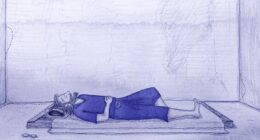Share this @internewscast.com
Catching the virus that causes cold sores almost doubles the risk of developing Alzheimer’s – but treatment slashes the odds, a study suggests.
Researchers previously found the herpes simplex virus type 1 (HSV-1) can lie dormant in human cells for a lifetime before ‘re-awakening’, leading to dementia symptoms.
It has been shown to cause changes that resemble those in the brains of dementia patients, such as amyloid plaque-like formations and inflammation.
Now, a large study suggests that treating HSV-1 may be a route to lessening the risk of Alzheimer’s disease.
Scientists, including from pharmaceutical firm Gilead Sciences and the University of Washington in Seattle, used data on 344,628 people with Alzheimer’s matched with the same number of people without the disease.
All were aged over 50 and the diagnosis of Alzheimer’s was made between 2006 and 2021.
A history of HSV-1 diagnosis was noted for 1,507 (0.44 per cent) patients with Alzheimer’s, compared with 823 (0.24 per cent) of those without.
Nearly two thirds (65 per cent) of those with Alzheimer’s disease were women, with an average age if 73.

Catching the virus that causes cold sores almost doubles the risk of developing Alzheimer’s – but treatment slashes the odds
The study found that people who had suffered the herpes virus had an 80 per cent increased risk of Alzheimer’s, even when other factors were taken into account.
But those with HSV-1 who used anti-virals to treat the virus were 17 per cent less likely to develop Alzheimer’s compared with those who did not the medicines.
Among the 2,330 people with a history of HSV-1 infection, 931 (40 per cent) used anti-virals after their diagnosis.
The authors, writing in the journal BMJ Open, concluded: ‘Findings from this large…study implicate HSV-1 in the development of Alzheimer’s disease and highlight anti-herpetic therapies as potentially protective for Alzheimer’s and related dementia.’
In the UK, the drug aciclovir is one of those available for treating cold sores, chickenpox, shingles and other herpes virus infections.
Data from the Open Prescribing website indicates doctors issue around 90,000 prescriptions for the drug in England each month.
The researchers also looked at the potential role of other herpes viruses, including HSV-2, varicella zoster virus (which causes chickenpox), and cytomegalovirus.
Both HSV-2 and varicella zoster virus infections were also associated with a heightened risk of Alzheimer’s disease.

Amyloid plaque forming between neurons in Alzheimer’s disease
Exactly how HSV-1 and other viruses might heighten the risk of dementia is not clear, point out the researchers.
‘However, studies have shown that inflammatory alterations in the brain caused by HSV infection are pivotal in (Alzheimer’s disease) development,’ they added.
HSV-1 DNA is also found in the plaques characteristic of Alzheimer’s disease, and people carrying the most common genetic risk factor for the disease are more susceptible to HSV infections, they said.
Professor Tara Spires-Jones, from the University of Edinburgh, said: ‘This is a well-conducted study adding to strong data in the field linking HSV-1 and other viral infections to increased risk of developing Alzheimer’s disease, but it is important to note that HSV-1 infection, which is extremely common in the population, is by no means a guarantee that someone will develop Alzheimer’s.
‘Why viral infections may increase risk of dementia is not fully understood, but the most likely explanation is that infections increase inflammation in the body and contribute to age-related brain inflammation.
‘More research is needed to understand the best way to protect our brains from Alzheimer’s disease as we age, including a better understanding of links between viral infection and Alzheimer’s risk.’
However, Dr David Vickers, from the University of Calgary in Canada, said the research ‘exaggerates the role of HSV-1, failing to appreciate its absence in 99.56 per cent of Alzheimer’s disease cases’.
He added: ‘The observed 17% hazard reduction with anti-herpetic drugs translates to a mere nine-month delay in Alzheimer’s disease onset.’

Professor Tara Spires-Jones, from the University of Edinburgh

The study found that people who had suffered the herpes virus had an 80 per cent increased risk of Alzheimer’s, even when other factors were taken into account
Dr Richard Oakley, director of research and innovation at the Alzheimer’s Society, said: ‘Results from this observational study suggested that people with recorded cold sore infections were more likely to develop Alzheimer’s disease, and interestingly those prescribed antiviral drugs had a slightly lower risk.
‘But this doesn’t prove that cold sores cause Alzheimer’s disease, or that anti-virals prevent it.
‘The data came from insurance records, often based on self-reported symptoms which may miss or misclassify infections, and didn’t track how often people had cold sores or how consistently they took medication.
‘Much more research is needed to explore exactly how viruses might be involved and before we can draw firm conclusions.’
Dr Sheona Scales, director of research at Alzheimer’s Research UK, welcomed the study but said more research was needed.
‘We know there are 14 established risk factors for dementia, and there’s not enough evidence to include infections in this list.
‘This study doesn’t tell us if infections are causing the risk, it only shows an association. Further research is needed to understand what the underlying biology around this is.’











